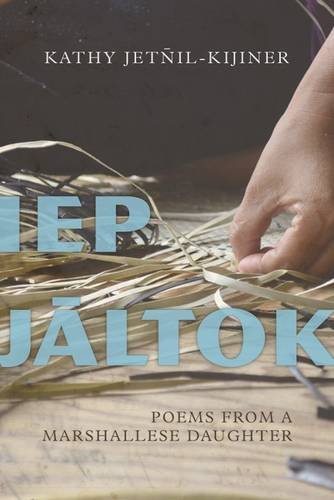“How is spoken word different from page poetry?” This question seems to have a pretty basic answer: one is written with the intention of being performed, or spoken aloud, while the other is written specifically for the page.
I’ve always felt that spoken word is more accessible to the average audience than written page poetry. I don’t know many people who actively choose to sit down and read books of poetry (besides other poets). But, many more are willing to listen to poetry – especially if that poetry was easy to follow and catchy. However, I don’t want to make it sound like spoken word is dumbed down poetry – it’s definitely not. It takes a lot of skill to be able to write something that’s easy to read, easy to hear, and easy for many people can connect to.
Before I put out youtube videos of my poetic performances, I had published my poetry in the newspaper back home in the Marshalls. Only a few people actually read those pieces (some cousins actually complained to me that they couldn’t/wouldn’t read them cuz they were too long). But when the youtube videos came out, quite a number of people came up to me saying that they had read my poetry before but didn’t really get any of it until they heard it. Most of these people were Marshallese. And I figured out that the reason they were able to understand it a lot easier is because our culture is essentially an oral culture – we’re great listeners, but reading and writing is still a bit of an isolated skill set. Spoken word, however, is able to bridge that gap between storytelling and poetry.
Originally, when I thought of spoken word, I immediately thought of slam. Slam is the competitive version of spoken word, and requires poets to keep their poetry to 3 minute performances, without the use of props or any other devices, and forces audience members to score the performance on an a scale of 1 to 10. This criteria can be limiting to the art form, but it can also force poets to create wonderful pieces under a guideline like any poetic form. It wasn’t until I took a spoken word class with a former mentor of mine that I was able to open up to the different forms that spoken word can take beyond slam poetry. Spoken word can last longer than 3 minutes – it can sometimes expand to 1 woman shows, or use props and clothing that add to the performance. My favorite, that I’d love to experiment with at one point, is performance with extra audio files, or performance with slide shows. One of my mentors even uses a coconut grater on stage while poetry plays in the background.
So how does page poetry fit into this? Well, first off, I consider page poetry the kind of poetry that takes into consideration the space of the page itself. This means the form of the poetry is an integral factor, not so much the sounds being made. This means you can have fun creating forms and shapes out of the poetry – I have one poem that’s actually in the shape of a boat, and one that I’ve been working on (who knows when it’ll actually be finished) that’s in the shape of a bingo card. But sometimes paying attention to these forms makes it hard to pay attention to the sound of the poem.
I started writing poetry without the aspect of performance in mind. It just came out of me naturally, and I didn’t really think about what I wanted to do with these pieces. Once I got into slam poetry, however, and started getting into that world of poetry, I was indoctrinated into this group thinking which looked down on page poetry, because of the fact that many traditional and page poets looks down on slam. I know I know – politics. Whatevs.
To be real though, there doesn’t have to be a line between the two forms. I think a good poet is able to cross the barriers of both forms – spoken and page. I mean why limit ones art work to just one form? My recent goal as a poet is to push the boundaries of what I’m comfortable with, and to explore and push myself as much as I can to write and tell the story however it needs to be told. In the end, my big question when writing isn’t always “Should this piece be a page poem or a performance poem?” Most of the time, my only question is, “How should this story be told?”

he is greatly honored for your insight…he is a malawian who has been writing page poetry,that he didn’t like and he has an (i)problem.
‘In the end, my big question when writing isn’t always “Should this piece be a page poem or a performance poem?” Most of the time, my only question is, “How should this story be told?”’
I agree with that statement. I also like your comment about the poetry just coming out of you. I think that is how it is for so many of us. It takes the right conditions – a person, an event – that somehow touches us, and then, the poem flows out.
Thank you for this post.
Thanks for the unique perspective. I’ve felt for a long time that respect for page poetry is diminishing. However, I prefer to take the stance of this article.
Intuitive article, and I agree with almost every point you make!